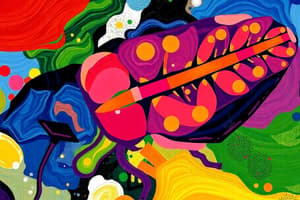Podcast
Questions and Answers
What is Biology?
What is Biology?
The study of life
It is not important to study Biology.
It is not important to study Biology.
False (B)
Which of the following is NOT a characteristic of life?
Which of the following is NOT a characteristic of life?
- Evolution
- Random growth (correct)
- Cells and organization
- Energy use and metabolism
What are the simplest units of life?
What are the simplest units of life?
What does metabolism involve?
What does metabolism involve?
How do living organisms respond to environmental stimuli?
How do living organisms respond to environmental stimuli?
What is homeostasis?
What is homeostasis?
Which of the following statements about reproduction is true?
Which of the following statements about reproduction is true?
New species can evolve as a result of genetic mutations.
New species can evolve as a result of genetic mutations.
Atoms are the ______ unit of matter.
Atoms are the ______ unit of matter.
What is the smallest unit of biological organization that biologists consider alive?
What is the smallest unit of biological organization that biologists consider alive?
Flashcards are hidden until you start studying
Study Notes
Introduction to Biology
- Biology studies life and living organisms, exploring their structures, functions, growth, and interactions.
- Significant discoveries arise from investigating living organisms, enhancing our understanding of life.
Characteristics of Life
- Cells and Organization: Cells are the fundamental units of life, organized into tissues, organs, and systems.
- Energy Use and Metabolism: Metabolism encompasses all chemical reactions within a cell, including energy conversion from photosynthesis and cellular respiration.
- Response to Environmental Stimuli: Organisms respond to changes in their environment, evidenced by:
- Plants flowering in response to daylight or temperature
- Venus flytrap responding to touch
- Plant stems growing towards light and roots towards gravity
- Regulation and Homeostasis: Homeostasis refers to maintaining a stable internal environment, such as temperature regulation (e.g., ~40°C for humans), and balance of water, glucose, and pH.
- Growth and Development: Organisms progress through stages of growth, illustrated by developmental processes, such as the transformation of a salamander from egg to adult.
- Reproduction: All organisms reproduce, creating offspring through:
- Asexual reproduction (e.g., bacteria, protists)
- Sexual reproduction (e.g., plants, animals)
- Evolution: Populations of organisms evolve through generations, driven by genetic mutations that can lead to the emergence of new species.
Levels of Biological Organization
- Organization progresses from small to large:
- Atoms: Smallest units of matter
- Molecules: Composed of bonded atoms; macromolecules like carbohydrates and DNA form when many molecules combine.
- Cells: Smallest unit of biological life; all organisms consist of cells.
- Tissues: Groups of similar cells performing a specific function.
- Organs: Structures composed of multiple tissue types working together.
- Organisms: Individual living entities.
- Populations: Groups of the same species in a particular area.
- Communities: Different populations interacting in a given environment.
- Ecosystems: Communities interacting with their physical environments.
- Biosphere: The global sum of all ecosystems, representing life on Earth.
Studying That Suits You
Use AI to generate personalized quizzes and flashcards to suit your learning preferences.




